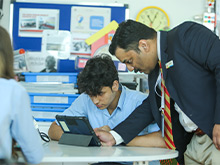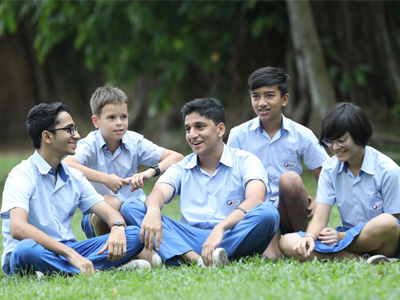Download our FREE Academic Calendar now! 📚 Start your child’s journey to success.
Basic manners and etiquette in children show that they have been raised and taught well. Kids learn from their parents; they basically imitate us. Therefore, it is important to be at your best behaviour in front of kids so that they can watch and learn.
Moreover, being a role model, it is also imperative not to lose patience while teaching them good manners. After all, being patient is also a good etiquette.
Instilling good manners from an early age is very important to make your child an overall pleasant, polite, and kind person. Teaching manners isn’t rocket science, but your toddler needs to learn more than just “please” and “thank you”.
While some parents feel that their only job is to enroll their child in a kindergarten and the rest will be taken care of by the school and teachers.
That isn’t how it works, as much as it is the school’s responsibility to teach good manners to your child, it is also your responsibility as a parent to teach your child how to behave in public, be polite and nice, give respect, etc.
Even the best schools in Noida would suggest that parents should start working on manners for kids prior to enrolling them in preschools. And, to do so, parents should model the kind of behaviour they want to see in their kids.
Here are some of the most important basic etiquettes that your younger ones should know for them to become a polite, kind, and well-liked child.
While some of them may seem like common sense, kids may not realize that it’s impolite to interrupt or pick their nose publicly. Kids don’t know what is expected from them unless we explain it to them.
1. Saying ‘Please’ and ‘Thank You’
This is the first and most important thing that your child must know. Saying ‘please’ shows consideration for others, while saying ‘thank you’ depicts appreciation and gratitude.
2. Saying ‘Sorry’
Apart from learning to say ‘please’ and ‘thank you’, learning to say ‘sorry’ when the child has done something wrong is the next important etiquette.
Teach your child to apologize when necessary and not just use it casually. Being empathetic is a skill each child should imbibe. Apologizing shows that they are taking responsibility for their actions.
3. Ask for Permission Before Taking Anything
Children should learn to take permission before taking or borrowing anything that doesn’t belong to them, even with their parents and siblings. They should also be taught to return borrowed things in a timely manner with a proper thank you.
4. Knock on Closed Doors
To raise a well-mannered child, parents must teach their kids to knock on the door prior to entering. Even if the door is half open, children must knock and await a response before going in.
Children must understand that privacy is very important and it is respectful to knock on someone’s door and ask permission before entering the room, even if it’s their parents room.
5. Saying ‘Excuse Me’
Children are naturally impatient and they always seem to be in a hurry. Therefore, it is necessary to teach them to say ‘excuse me’ so as to take permission prior to talking to someone or passing by people. Learning to say ‘excuse me’ shows consideration for others. It teaches them how to be a part of a conversation without interrupting anyone.
6. Covering Mouth When Coughing or Sneezing
Thanks to the pandemic, 99 percent of kids today know the importance of covering one’s mouth. As much as it is rude to pick one’s nose publically, it is also unpleasant to not cover one’s mouth with a handkerchief or a tissue while coughing or sneezing. Teach them this basic habit from the very beginning so that it becomes a habit.
7. Sharing
As the saying goes “Sharing is caring”, children must learn to share. Sharing shows that you care and others become appreciative of you. This habit is quite important for children as they would need to share their toys or food with their friends at home and school. Start teaching this quality by sharing things with them while playing with them.
8. Making Eye Contact
Looking people in the eye while talking to them shows confidence and respect for others. Practice eye contact with your kids while having conversations with them to imbibe this good habit in them. They will grow up to have good social relationships by learning this early.
9. Not Pointing or Staring at People
Children don’t know that it is rude to point at someone or stare at someone. They might be doing it unintentionally. But, this can be taught to them by saying that while pointing at someone, three fingers are always pointing back at them. Make them understand that this is considered rude and how they would feel if they were pointed or stared at.
10. Compliment but Don’t Comment
Children should be taught the difference between complimenting someone and commenting something negative about someone. This quality will not only make others feel good about your kid, but will also help in building stronger reciprocal relationships.
Also Read: Importance of Preschool Education
11. Being Kind to Everyone
The world needs kindness more than anything else. Teach your kids to be kind to all human being and animals, without discriminating.
Your child may see a person with a disability and may get scared or ask questions which might be rude, thus, it is important to teach them that everyone must be treated equally irrespective of their features.
Similarly, your child should be kind towards animals too, especially the ones living on the streets. It’s ok to be scared of animals, but it’s not ok to throw stones at them for no reason.
Conclusion
If you start imbibing these good habits yourself, your children will surely incorporate them in their lives too. Since children see their parents as their role models, it is imperative to never use foul language in front of them.
Also, parents must appreciate and encourage their kids whenever they do something right or display a good habit.
GIIS Noida Preschool wishes you happy parenting!



































